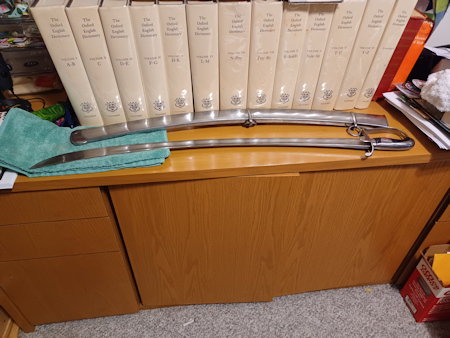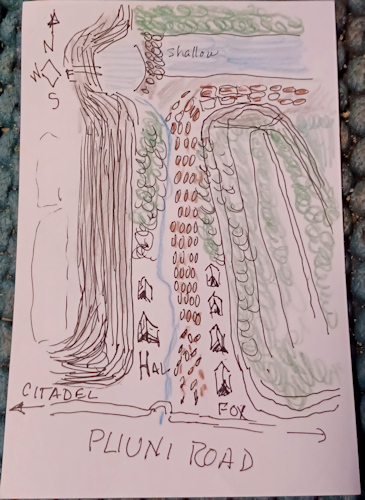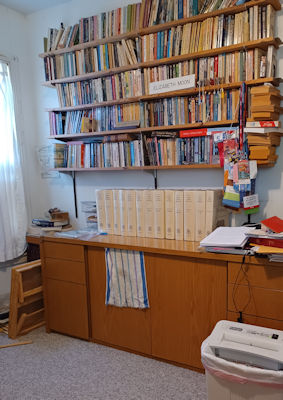Horngard I has a new first chapter, new first section of the first chapter, and everything is now “clean” through C-3. One segment that was second in C-1 is now at the end of C-2, and other segments (aside from the very first, which is new) have been shifted around (often more than once, like […] [...more]
Horngard I has a new first chapter, new first section of the first chapter, and everything is now “clean” through C-3. One segment that was second in C-1 is now at the end of C-2, and other segments (aside from the very first, which is new) have been shifted around (often more than once, like quilt pieces) to find their best spot. General tightening to make the new arrangement work better. And so on. Chapters will need to be re-numbered, at least (right now there are two C-3s, one helpfully saved as C-3+) and more splits and/0r joins may need to be done as this revision progresses. Since re-numberiung this many chapters (34 now, will likely be 35 if I don’t find more largeish cuts to make) is tedious and it’s easy to make mistakes, relabeling the second “overlapping” chapter and leaving re-numbering to the end seems to work more smoothly. For me, anyway.
This, and maybe some subsequent posts, is a “technical writing” post. How do you fix the front end of a book–what decisions are involved, what actions need to be taken, and what natters most? Though it’s a “how-to” and “how-not-to” post, it is not (except for Rule One–maybe) a black-and-white prescription. As always, my way is NOT the highway, but a crooked path through the wilderness. If you find yourself in the wilderness with your book (first or thirtieth) it’s a reminder to look at that first chapter you were so happy with six months ago. Maybe it could be where the problem with the book started.
Rule One Don’t bore the reader. Bored readers don’t finish the book unless they need it to pass a test. If they’re bored on page one, they’re done with it. This is why even bestsellers don’t sell to everyone…someone’s bored, they don’t buy the book. If you leave the finished book alone for a few months to…um…ripen or rot…and then you start to read it, and you find yourself skipping the first chapter after the first page…be sure to have no fewer than five people read that first chapter alone (no reward visible) and listen to their comments. “Starts kinda slow…” means “I was bored. “I guess we’ll find out what it’s about later on, huh?” means “I was bored.” And so on. Reader boredom anywhere in a book damages it, but reader boredom at the start kills it.
The most common cause of boring starts is starting before the action. The writer often needs to start writing before the book starts; the writer certainly can spend words and time on setting up when/where/who/how the start is going to happen, and ease into the story itself…but the reader, especially the modern reader, wants to feel, from the first page at least, that they’ve stepped into a strong narrative current and are being pulled along. Doesn’t have to be a roaring flood, but does have to be a current.
A contribution to boring starts that will overwhelm even starting where the story itself starts is too much information too soon. (And if that sentence was a boring, there’s your clue.) If you have even a touch of “instructor” in you, you’ll be tempted to demonstrate your knowledge, as well as your storytelling. I have a large bump of instructor, since I’ve tutored individuals and taught classes…and like many instructors, I’ve been sure my lessons were interesting and useful to my captive audiences of students. But…the students didn’t have much choice. As a writer, your readers have many choices of what to read, and as a fiction writer, they didn’t come to you to learn about the English civil war, the pastimes of medieval peasants, how a ‘tall ship” is rigged, or exactly how to grow food for your family on a quarter acre. If you write fiction, your readers are fiction readers, and they want a good story. Story needs to be there in that critical first few pages. So don’t front-load your book with description, a history lesson, or the things that fascinate you about the story you’re telling…tell the story itself.
How does this relate to what was wrong with my earlier beginnings to Horngard I? Here comes Rule Two: Get important characters into the first scenes. Characters make stories. Introduce the characters readers will be following at the beginning. Not–as the old Bobbsey Twins books used to do it, with a page of “Let’s get to know the Bobbsey twins” infodump–but instead with a name, an action, and a glimpse of their thoughts, feelings, selfhood from inside. It can be in an immediate crisis (Paks and her father having a row, Brun climbing a cliff being shot at, Ky called out of class and forced to resign), or in a calmer but still active situation (Gird setting off with a basket of fruit for the required tax, Heris taking command of a civilian’s personal yacht, or–in the present case after fixing the problem–a young man riding out of the foothills toward a city, thinking what he’s been told to do.) In the previous version of Horngard I’s beginning, I had Dragon flying around looking at the old citadel and remembering and thinking and planning and then going away again. Followed by a long scene with some bad guys dealing with their own problems –neither bad guy likely to attract a reader’s interest on his own– and the co-protagonist, who is now up first, not showing up for pages and pages and pages. Oops. Stories are *about* someone as well as something. Dragon is not a character. Dragon is a Force, or Power…not a deity, but the personification of transformation, or change. Yes, a dragon can fry you with its breath, but it’s more like plate tectonics than a character.
Rule Three: Get someone doing something in the first scenes. Stories are about someone doing something that matters to them (and hence to the still-imaginary and future reader.) Character sitting on the bank fishing and nothing’s biting? Quickly boring. Character sitting anywhere and just musing…quickly boring. Character riding toward a city still confused about what he’s supposed to do…most readers can think of branching lines of possibilities in that. Another character on a fractious horse on a dangerous mountain path near a cliff…again, readers can imagine multiple possibilities there, too. Both of those are a) doing something and b) doing something that has potential problems all over, leading reader to mild suspense. Will this confused character be unable to function in the noise and confusion of a city? Will he get robbed? Will he find someone who can clear things up for him? Will the character on the fractious horse end up in pieces at the bottom of the cliff? If one character (not of these two alone, any two) thinks of the other, wants to find the other, wants to avoid the other, wants to kill, or save, or make love to the other, that adds another layer of possibility to the plot, and raises the reader’s interest. If they’re both going to the same city, especially. The reader will have several questions in mind that the reader wants answered. Questions the reader wants answered count as “suspense.” Suspense is good reader-glue. The sooner in a book the reader wants to read the next page, the better.
Notice…I broke all three rules in that first chapter. Boring instructional glop in the first section (OK, it had Dragon, who’s not intrinsically boring, but also not a character the reader will identify with at all.) Minor characters loosely connected with a minor character in earlier books, unpleasant, doing not much besides talking & planning, in the second section. They did at least mention they were planning to kill the person in the next section but they didn’t actually DO that, or even approach it more closely, until several chapters later. Third section finally introduced a character, but not one of the major characters, and what was she *doing*? Sitting (SIGH) and signing a contract and thinking about the general state of things. Then she heads off for lunch. That’s really riveting storytelling, right? Er…um….no. It’s not.
New start: Start of plot, major character shows up in Significant Clothes (knight in shining armor on fancy horse) with definite immediate goal (get to city, get to banker…oh, so there’s MONEY involved?!) and confusion about how to accomplish future goal. Dragon in his past (hmm), memory loss, and according to Dragon, important future. Then another major character shows up, headed to the same city, from farther away, on a steep and dangerous mountain trail on a fractious young horse next to a cliff where the rocks below are decorated with bits of wrecked wagons and skeletons. Both characters are named. So previous readers in that story-universe have an advantage and almost certainly put 2 and 2 together and get the right answer, but new readers are being handed information they need when they need it…and their minds will correctly decide that both these guys are important, and since they’re headed for the same city, might meet. Another important minor character from previous books, tightly connected to Major Character 2 is also in that scene. Next scene down, another important minor character is connected to Major Character 1. Then Major Character 2 drops a final clue. Even new readers are now oriented to two major characters’ relationships to the most significant secondary characters and their potential relationship to each other, their ultimate goals as they see them, and some of the difficulties foreseen by characters and writer.
More coming another day.



